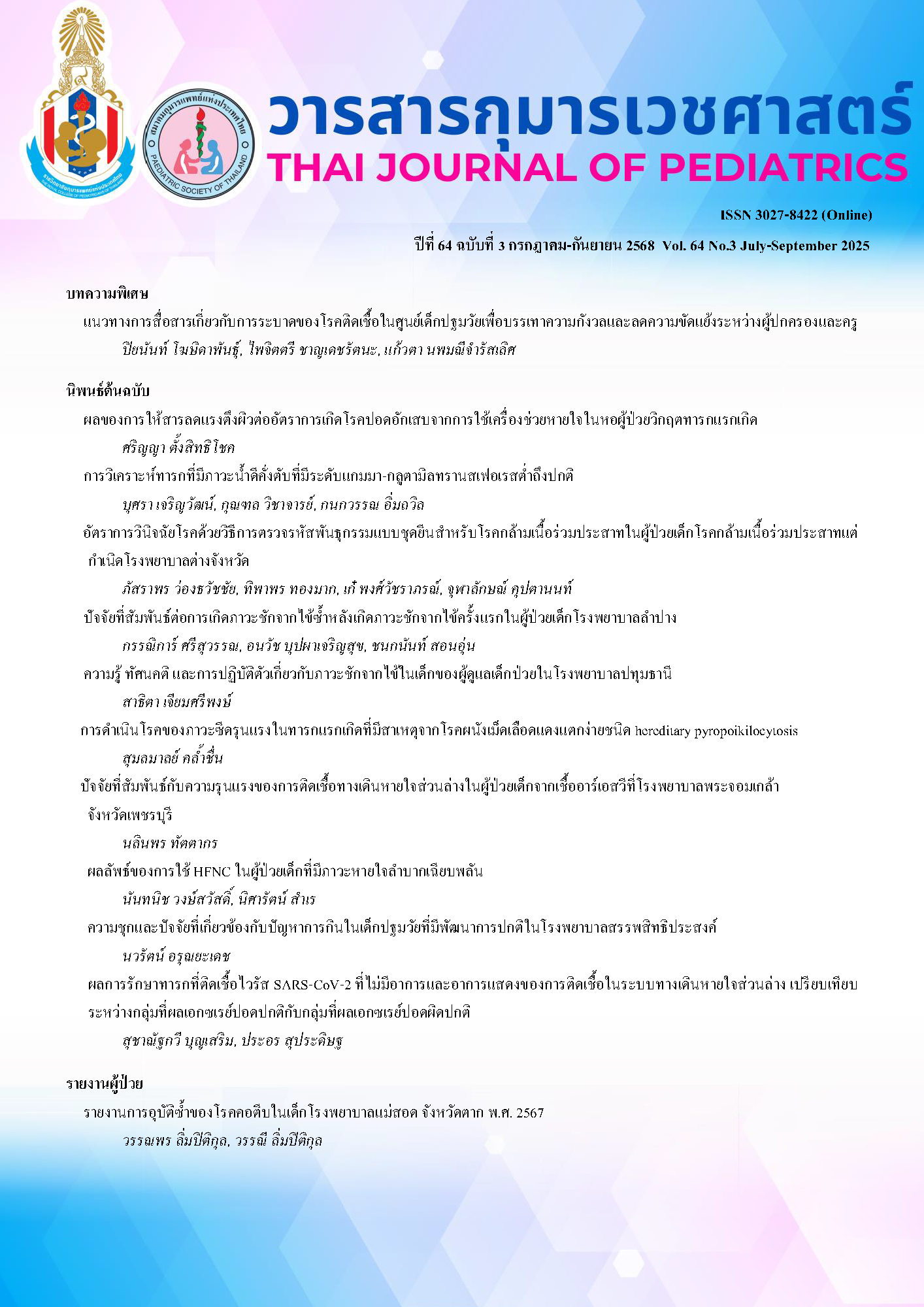Knowledge, attitudes, and practices of caregivers regarding febrile seizures in children in Pathum Thani Hospital
Keywords:
Anxiety, Apgar Score, Pediatric intensive care, Knowledge, Practices (KAP)Abstract
Background: Febrile seizures are common in children aged 6 months to 5 years. Although generally benign, they often cause anxiety among caregivers due to misconceptions, such as fears of brain damage, developmental delay, or increased epilepsy risk. Inappropriate first aid during seizures may also lead to injury.
Objective: To assess caregivers’ knowledge, attitudes, and practices (KAP) regarding febrile seizures and identify associated factors related to KAP.
Methods: A descriptive, prospective study was conducted at Pathum Thani Hospital from September 2024 to April 2025. A total of 478 caregivers of pediatric patients completed a 32-item KAP questionnaire of febrile seizures.
Results: Among the participants, 83.7% were female and 72.4% were mothers. Most had completed secondary education (51.9%) and had low income (78.0%). Overall, 59.6% had low knowledge scores (<70%). Common misconceptions included inserting objects into the mouth during seizures (46.5%), risk of permanent damage or death (72.6%), and increased epilepsy risk (68.7%). Most caregivers (89.2%) felt anxious and unsure how to respond during seizures. However, many reported correct practices such as staying calm (87.8%), tepid sponging (85.7%), and bringing the child to hospital promptly (97.2%). Logistic regression analysis identified significant associations between higher caregivers’ knowledge and the following factors: child’s birth order ≥4, diagnosis of febrile seizures, a family history of febrile seizures, and education (voc. cert., high voc. cert., and bachelor’s degree). Factors influencing attitudes included child’s age ≥5 years, seizure history (1-3 times), and bachelor’s degree. Factors influencing practices included diagnosis of febrile seizure. Good knowledge was significantly associated with a positive attitude (OR adjusted = 4.6) and appropriate practices (OR adjusted = 2.1)
Conclusion: Most caregivers had inadequate knowledge and some misconceptions about febrile seizures. Educational interventions are needed to improve understanding, reduce anxiety, and promote appropriate management.
Downloads
References
Randel A. AAP updates guidelines for evaluating simple febrile seizures in children. Am Fam Physician. 2011;83:1348-50.
Tsubai T. Epidemiology of febrile and afebrile convulsions in children in Japan. Neurology. 1984;34:175-81.
Hackett R, Hackett L, Bhakta P. Febrile seizures in a south Indian district: Incidence and associations. Dev Med Child Neurol. 1997;39:380-4.
Patel N, Ram D, Swiderska N, Mewasingh LD, Newton RW, Offringa M. Febrile seizures. BMJ. 2015;351:h4240.
Srinivasa S, Syeda KA, Patel S, Harish S, Bhavya G. Parental knowledge, attitude, and practices regarding febrile convulsion. Int J Contemp Pediatr. 2018;5:515-9.
Tiwari A, Meshram RJ, Singh RK. Febrile seizures in children: A review. Cureus. 2022;14:e31509.
Veisani Y, Delpisheh A, Sayehmiri K. Familial history and recurrence of febrile seizures: A systematic review and meta-analysis. Iran J Pediatr. 2013;23:389-95.
Commission on epidemiology and prognosis, international league against epilepsy. guidelines for epidemiologic studies on epilepsy. Epilepsia. 1993;34:592-6.
Whelan H, Harmelink M, Chou E, Sallowm D, Khan N, Patil R, et al. Complex febrile seizures: A systematic review. Dis Mon. 2017;63:5-23.
Lee SH, Byeon JH, Kim GH, Eun BL, Eun SH. Epilepsy in children with a history of febrile seizures. Korean J Pediatr. 2016;59:74-9.
Chang YC, Guo NW, Huang CC, Wang ST, Tsai JJ. Neurocognitive attention and behavior outcome of school-age children with a history of febrile convulsions: A population study. Epilepsia. 2000;41:412-20.
Subcommittee on febrile seizures; American academy of pediatrics. Neurodiagnostic evaluation of the child with a simple febrile seizure. Pediatrics. 2011;127:389-94.
Leung AKC, Hon KL, Leung TNH. Febrile seizures: An overview. Drugs Context. 2018;7:212536.
Zeglam AM, Alhmadi S, Beshish A. Auditing the attitude and knowledge of parents of children with febrile seizures. Afr J Neurol Sci. 2010;29:3-8.
Kolahi AA, Tahmooreszadeh S. First febrile convulsions: Inquiry about the knowledge, attitudes and concerns of the patients’ mothers. Eur J Pediatr. 2009;168:167-71.
Shibeeb NF, Altufaily YAS. Parental knowledge and practice regarding febrile seizure in their children. Med J Babylon. 2019;16:58-61.
Almousa A, Alshahrani D, Almubarak MS, Alothman A, Alrashoudi AM, Alsharif A, et al. Parents' knowledge, attitude, and practice regarding febrile convulsion in children in Riyadh, Saudi Arabia. Cureus. 2023;15:e47314.
Sajadi M, Khosravi S. Mothers' experiences about febrile convulsions in their children: A qualitative study. Int J Community Based Nurs Midwifery. 2017;5:284-91.
AlZweihary A, Alkhalifah RS, Alrayes RM. Knowledge, attitude, and practices of parents of children with febrile convulsion in Al-Qassim, Saudi Arabia. Int J Med Dev Ctries. 2021;5:229-36.
Eta EV, Gaelle AN. Knowledge, attitudes and practices of parents regarding convulsion in children under five years in Muea community, Cameroon. Pediatr Neonatal Nurs Open J. 2021;7:13-20.
El Sayed HI. Recognition of parents’ knowledge, attitude and practice regarding febrile seizures in children under five. Am J Nurs Res. 2020;8:72-81.
Krishnan A, Sreeja PA. A prospective study on the assessment of knowledge, attitude and practice of parents regarding febrile seizure. Int Res J Pharm. 2020;11:8-12.
Ng HL, Li H, Jin X, Wong CL. Parental knowledge, attitudes, and practices towards childhood fever among South-East and East Asian parents: A literature review. PLoS One. 2023;18:e0290172.
Downloads
Published
How to Cite
Issue
Section
License
Copyright (c) 2025 The Royal College of Pediatricians Of Thailand

This work is licensed under a Creative Commons Attribution-NonCommercial-NoDerivatives 4.0 International License.



